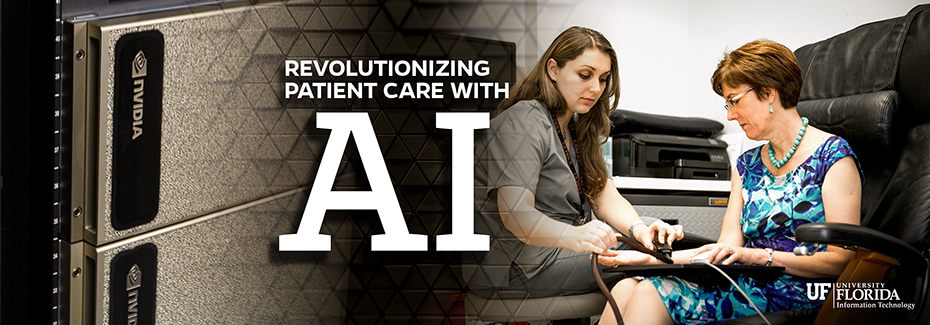Sub-Title: The University of Florida launches GatorTron™, a natural language processing model built to advance medical decision-making and improve health outcomes
By Lindsay Gamble, UFIT Communications Specialist
The University of Florida is transforming patient care using artificial intelligence (AI). UF Health researchers collaborated with NVIDIA to create GatorTron™, a natural language processing model that accelerates the medical research process, paving the way for life-saving discoveries.
The creation of GatorTron™ was enabled by HiPerGator, the University of Florida’s AI supercomputer. With 1,120 Ampere A100 GPUs and 700 petaflops of AI processing speed, HiPerGator is the fastest supercomputer in U.S. higher education. The supercomputer is based on an NVIDIA DGX SuperPOD of 140 DGX A100 nodes and NVIDIA Mellanox HDR InfiniBand networking. As proof of its speed, GatorTron™ was trained on HiPerGator in only seven days.
Since its founding as a land-grant institution, the University of Florida has grown to become one of the top public universities in the nation, with over 100 undergraduate majors and 200 graduate programs. UF is now undergoing a new transformation. Provost and Senior Vice President of Academic Affairs Joseph Glover is leading efforts to infuse AI across the university, from the classroom to research labs.
To support transformational science and discovery, UF Information Technology (UFIT) built a computing infrastructure worthy of an AI University. UFIT staff completed major upgrades to the UF Data Center and built the third generation of HiPerGator in just six months. With HiPerGator now up and running, researchers have already begun using the supercomputer to discover solutions to complex problems, from food insecurity to early detection of diseases. GatorTron™ is just one example of what is possible with HiPerGator.
GatorTron™ is based on BERT, a breakthrough natural language processing model invented by Google in 2018. NVIDIA engineers used the BERT code to build BioMegatron, a biomedical language model optimized for large problems on NVIDIA’s DGX SuperPOD supercomputer. The UF team and NVIDIA then used HiPerGator AI to process clinical data from UF Health to create GatorTron™.
“The outstanding performance of GatorTron™ surprised the team,” said Erik Deumens, director of Research Computing. “This was hard work but fun, and it had a great outcome.”
GatorTron™ allows researchers to identify patients for clinical trials and studies with increased speed and accuracy. Physicians can use the model to inform medical decisions for patients, from recommending treatment plans to mitigating the risks of a surgical procedure.
With 10 years of patient data from over two million patients and 50 million patient interactions, GatorTron™ is the first natural language processing clinical model of its scale in the world. Before GatorTron™, researchers and physicians had to search for valuable data in the full-text notes of patient records. UF Health researchers and NVIDIA developers trained the model to recognize complex medical terminology used in patient notes. Now all that information is easily extracted, reducing the time it takes to find candidates for clinical trials from months to minutes.
The impact of AI extends far beyond the medical field. UF’s AI Initiative touches all disciplines, ensuring that every graduate leaves the university with the experience and knowledge to apply AI in their chosen career path. UF is also sharing its expertise with other institutions by granting access to HiPerGator and providing AI education to underserved communities. With the power of AI, the opportunities are limitless.
“UF is creating an AI support network for the entire community, ranging from short online tutorials to semester-long courses and in-depth workshops,” Deumens said. “The goal is to give everyone the opportunity to become knowledgeable citizens, users, and creators of AI.”

